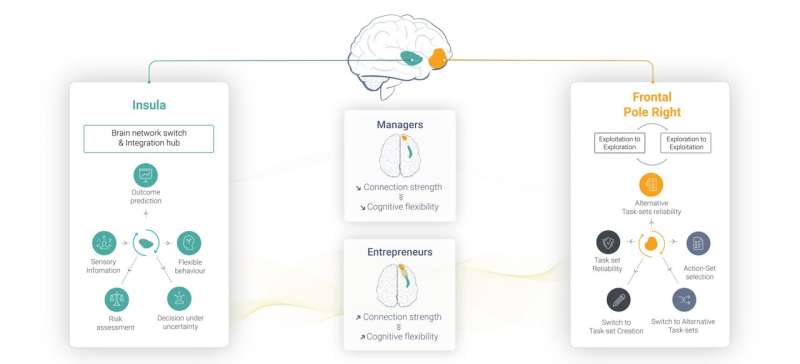This article has been reviewed according to Science X's editorial process and policies. Editors have highlighted the following attributes while ensuring the content's credibility:
fact-checked
trusted source
proofread
Entrepreneurs' brains: Researchers reveal increased cognitive flexibility

In a pioneering study involving serial entrepreneurs and managers, a multidisciplinary research team led by HEC—School of Management at the University of Liège and Liège University Hospital (CHU Liège), combining entrepreneurship researchers and brain specialists, found evidence of increased neuronal connectivity in the brains of entrepreneurs, which may contribute to distinct cognitive attributes.
Using resting-state functional magnetic resonance imaging (rs-fMRI), the study showed that serial entrepreneurs have higher connectivity between the right insula (associated with cognitive flexibility) and the anterior prefrontal cortex (a key region for exploratory choices), compared to their fellow managers.
These results, published in the journal Entrepreneurship Theory and Practice, suggest that serial entrepreneurs possess greater cognitive flexibility, enabling them to alternate effectively between exploration and exploitation, a balance that is crucial to their success.
Unlike the traditional fMRI approach based on tasks submitted to the subject, the rs-fMRI on which this study is based observes the brain at rest, in the absence of cognitive tasks or presentation of stimuli, which constitutes an innovative approach to improving understanding of the entrepreneurial mind. Forty people, entrepreneurs and managers, took part in the study.
"This study represents an important advance in our understanding of the entrepreneurial mind. It highlights the potential of neuroscience and how this approach complements the traditional tools used to study entrepreneurial cognition," explains Frédéric Ooms, researcher and Assistant Professor in management and entrepreneurship (HEC—ULiège School of Management), first author of the publication, based on the results of his Ph.D. thesis on entrepreneurial cognitive flexibility presented in April 2023.
"By highlighting the difference in cognitive flexibility, it also offers a new perspective to inform the design of training or professional development programs aimed at improving the cognitive flexibility and entrepreneurial spirit of individuals within various organizations."
"In a world of rapid and unpredictable change, organizations need to cultivate an entrepreneurial mindset and foster cognitive flexibility within their teams, qualities recognized by the OECD as a 21st century challenge," points out Professor Bernard Surlemont, Professor of Entrepreneurship at ULiège (HEC Liège).
"This collaborative, multidisciplinary study illustrates 'neuro-entrepreneurship', the integration of knowledge in neuroscience (at the ULiège GIGA and the CHU of Liège) and the world of entrepreneurship (HEC Liège), and shows how neuroimaging techniques help to better visualize the neural networks involved in 'cognitive flexibility', in order to be able to adapt to a constantly changing reality, which is the source of entrepreneurial success," notes Dr. Steven Laureys, neurologist and Clinical Professor at the Centre du Cerveau of the University Hospital (CHU) of Liège.
More information: Frédéric Ooms et al, Advancing (Neuro)Entrepreneurship Cognition Research Through Resting-State fMRI: A Methodological Brief, Entrepreneurship Theory and Practice (2023). DOI: 10.1177/10422587231170217


















